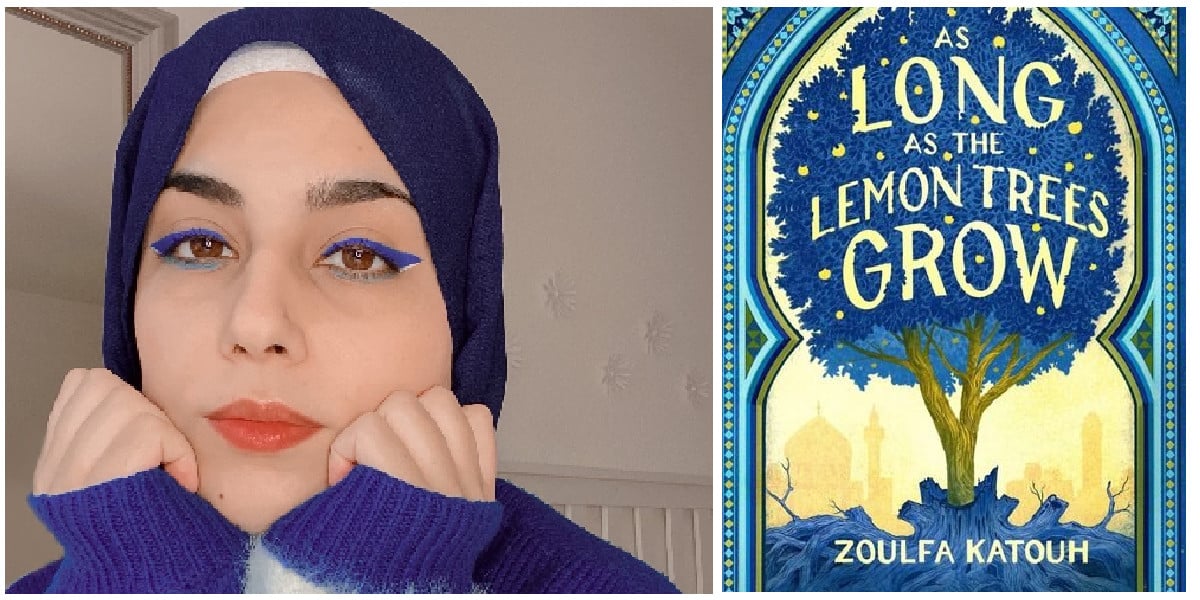Zoulfa Katouh broke into the YA genre with a splash with her gripping, powerful debut novel, As Long as the Lemon Trees Grow. As Long as the Lemon Trees Grow released in the U.S. on September 13, 2022, and will release in the U.K. on September 15, 2022, making Katouh the first Syrian YA author to be published in the U.S. and U.K. Katouh decided to write a YA novel set during the Syrian Revolution in Homs, when she recognized that many Americans and Europeans are unaware of the Syrian Revolution and what it means.
As Long as the Lemon Trees Grow follows Salama Kassab, a teenager who is studying to be a pharmacist when the Revolution breaks out. Within the course of days, she loses her family, home, and freedom. She volunteers at a hospital in Homs, where she’s promoted from a pharmacy student to a surgeon, as she treats the martyrs of the Syrian Revolution. Salama is desperate to leave Syria with her pregnant sister-in-law, Layla. However, the road from Syria is not an easy one, especially combined with Salama’s fractured consciousness, which switches between being tormented by the physical embodiment of Khawf, or Fear, and feeling that she’d be leaving her country behind if she left.
When Salama meets Kenan, a sweet young love blossoms between them, as they slowly learn what hope is and how to help their country from any part of the world. As Long as the Lemon Trees Grow is a painful tale that encompasses the untold truths of Syria and its people, as well as a sweet love story seeped in hope. I was honored to have the opportunity to speak to Katouh about her powerful debut novel. We talked about the personification of fear, the difference between a war and revolution, Muslim representation in media, and Studio Ghibli.
Rachel Ulatowski (TMS): Knowledge and awareness of what is happening in Syria is something that many Europeans and Americans, of all demographics, lack. What made you choose to focus specifically on Young Adult audiences with As Long as the Lemon Trees Grow?
Zoulfa Katouh: When I first began writing Lemon Trees, my target was always mainly the younger generation because they’re the ones who will be responsible in the future for making decisions. Stories teach empathy and if I have a hand cultivating that in young minds, then I’d have done my job. I’d have helped make their world a little bigger.
TMS: As Long as the Lemon Trees Grow personifies Khawf, or Fear, in such a vivid manner, detailing everything down to his appearance. What gave you the idea to personify Khawf and is there a meaning behind his specific appearance (e.i. his suit, icy blue eyes, midnight-black hair, the red dots on his shoulders)?
Katouh: In my faith, we believe everything has life. From the sky to the trees to the river to the pebbles, and all in between. That also goes for abstract emotions like love and fear. And so, I thought why not add a little twist of the speculative to bring the story closer to readers’ eyes and hearts. Coming up with his physical appearance was a result of my teen brain that absorbed so much of the antiheroes in fantasy, and I wanted to give myself and the people that.
TMS: As Long as the Lemon Trees Grow heartbreakingly depicts the pain and devastation that is a reality in Syria, however, it also encompasses a poignant love story between Salama and Kenan. What do you think was the benefit of presenting the horrors of the Syrian Revolution alongside a story of young love?
Zoulfa Katouh: The young love was always meant to be the sliver of hope between the loud moments. It made the harshness more devastating and the quiet times Salama and Kenan spend together all more precious. I wanted to show life that persists and goes on even if everything seems bleak at the moment. I wanted to show them as more than their pain. They’re teens who fell in love and are owed a life.
TMS: In As Long as the Lemon Trees Grow, Salama sometimes refers to the Syrian Revolution as a war, despite Layla and Kenan steadfastly calling it a Revolution. For those unfamiliar with these terms, what is the difference between war and revolution and why is it important to accurately label the Syrian Revolution?
Zoulfa Katouh: Revolutions have happened throughout history from the dawn of time. The Syrian Revolution is just one of countless ones. We don’t call the French Revolution the French War and we don’t do that with the American Revolution either. So what makes Syria any different? In all examples, it was people revolting against an entity that oppressed or took advantage of them. Syria is no different.
TMS: Muslims are frequently under-represented or misrepresented in literature and other media. How do you think characters like Salama and Kenan challenge stereotypes and what do you hope these characters will mean to your young adult readers who may identify with them?
Zoulfa Katouh: Sadly, for so long, Muslims have been painted with the broadest brush available. Negative stereotypes that do sometimes exist within our communities have been made the norm. And so, the balance was heavily tilted to one side, ignoring millions of Muslims whose experiences aren’t the extreme. While negative stereotypes should be challenged and whenever something bad happens within our communities, we need to speak up about it, address it, and fight it, there is no nuance in the media to show the other side. Salama, Layla, and Kenan represent the other side. Their problems aren’t their religion. It’s not an identity crisis of them rejecting where they come from. In fact, they’re proud of who they are. And that is something I want Muslim readers everywhere to read. I want them to not be apologetic Muslims, and I want the world to see us as people who pride themselves in their religion, heritage, culture, and history. Stories like this do so much for confidence and acceptance. If I had stories like that when I was younger, my journey towards self-acceptance and loving myself wouldn’t have been so long. We are not what they wrote us to be. We are more than that.
TMS: In As Long as the Lemon Trees Grow, both Salama and Kenan have found deep inspiration in Studio Ghibli. When were you first acquainted with Studio Ghibli and did it inspire you in a similar manner as it did Salama and Kenan?
Zoulfa Katouh: My first Studio Ghibli movie was Spirited Away, and I was nine years old, watching it on a small TV screen in the kids play area of a restaurant in Switzerland. I was utterly swept away. Hayao Miyazaki has done so much for us Ghibli fans. He founded my imagination, and this is why the book is dedicated to him. Whatever we read or watch in our childhood becomes an integral part of us in ways we can never imagine. Studio Ghibli bleeds into my everyday life. I try to romanticize the mundane. I adore public transportation in particular trains. I cook my food to have the same feel as the ones in Studio Ghibli. Nature is where my soul heals. And I find flickers of it in my writing. The roots Ghibli has in my brain are deep.
For Salama and Kenan, I chose a movie that represents their innocence and Castle in the Sky was the perfect one.
TMS: As Long as the Lemon Trees Grow highlights the very different ways in which individuals can help Syria, from any corner of the world. In what ways do you hope your novel will help Syria?
Zoulfa Katouh: I hope it spreads the word about what’s happening. Maybe, hopefully, it reaches someone who can do something. It doesn’t have to be saving the world on an earth wide scale because saving the world exists in the smallest actions as well. A donation here, a kind word there, a smile. This all makes a difference. And hopefully, it makes the world a kinder place for Syrians to be welcomed in because leaving your home is no simple decision.
(featured image: Little, Brown and Company, Zoulfa Katouh)









Published: Sep 13, 2022 03:42 pm